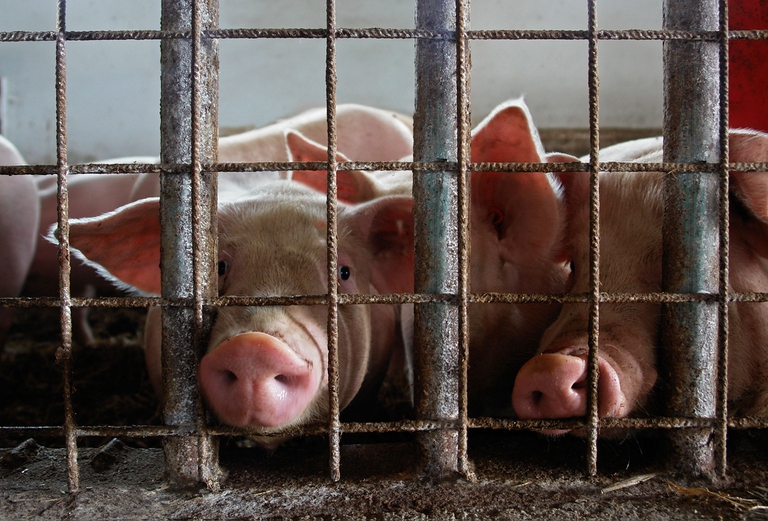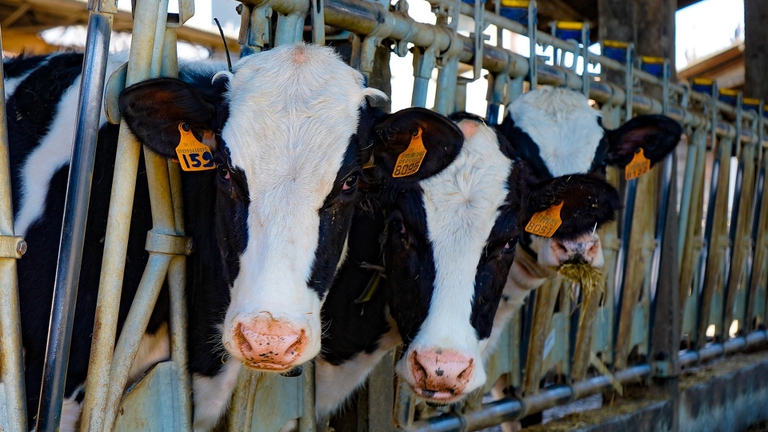https://www.lifegate.it/animali-in-gabbia
- |
In European farms, every year, over three hundred million animals raised they spend all or most of their lives in cages and pens, with serious repercussions on their health.This is most of the chickens used in Europe for the production of eggs, sows forced to give birth to their puppies between bars and almost all rabbits bred, without forgetting calves, quails and ducks.

All these animals are forced to live in spaces so small that they are unable to even perform the most natural movements.This is what happens to chickens, locked inside overcrowded cages where they end up hurting themselves against the metal nets in a vain attempt to open its wings.
Or to calves, who after giving birth are forever removed from their mothers and isolated, without being able to receive their care or breast milk.The sows then, forced to breastfeed their babies through the bars, they endure levels of stress and frustration such as to develop anomalous behaviors, such as biting the bars and chewing emptyly.
Vote for animals
Faced with this injustice, there are many Italian citizens who at the polls, on 8 and 9 June, they decided to vote for animals too:up to 18 candidates signing the manifesto “Vote for animals” who are committed to reducing their suffering have been elected and will sit in the European Parliament for the next five years.
It's about a significant result, which shows how much people believe in a better world for animals raised for food purposes, among the most forgotten and least protected of all.Cage breeding represents precisely this one of the cruelest practices compared to which the European Commission has taken a historic decision, which however risks remaining unimplemented.
Although in 2021 it has committed to gradually eliminating the use of cages in European farms by 2027, the Commission has not yet presented no proposal to ban cages.This should have arrived by the end of last year, but all is still quiet.
Some Member States have already introduced national legislation banning or phasing out some forms of cage farming, but no European country is truly totally cage-free.The incentives for companies to abandon cages have something to do with it, as well as political sensitivity and public attention on the topic.
The situation in Europe
There are among the most virtuous countries Luxembourg, Austria And Sweden, with more than 96 percent of animals cage-free;instead they close the ranking, drawn up by “Compassion in world farming”, Estonia and Spain, with less than 15 percent of animals raised outside of cages, and Malta, which barely reaches one percent.THE'Italy ranks mid-table, with 36 percent of animals exploited by the food industry that still live locked up.
This patchy situation damages the animals above all and as always.Without common protections, these sentient beings they remain at the mercy of the interests of the livestock industry, victims of abuse and violence.If Europe postpones its intervention, we Animal Equality though we are not watching.

Together with the other Italian associations for animal protection, we support the appeal of the Citizens' Committee promoting the European Citizens' Initiative (ICE) "End the cage age", which gathered 1.4 million signatures of European citizens determined to eliminate cage farming in Europe.The appeal, presented in March at the Court of Justice of the European Union, points the finger at this the European Commission's lack of commitment and aims to obtain a concrete intervention once and for all.
If the Court of Justice agrees with us, the Commission will finally be obliged to publish its legislative proposal. The change, In short, he can't wait any longer.In the meantime, each of us can do our part by choosing an increasingly plant-based diet that leaves animal suffering off the table.
